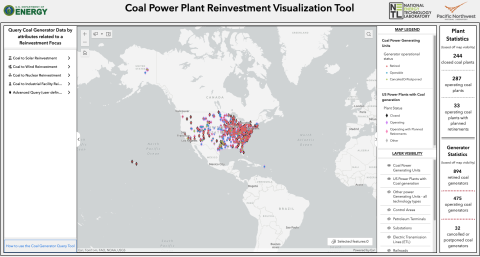Coal Reinvestment Resources
PNNL is supporting “coal-to-X” reinvestments by applying expertise in efficient, advanced technologies to reduce energy costs for households. Below are the available resources.
Reports and Additional Publications
Assessing Energy-Related Redevelopment Options for Pennsylvania's Retired Coal Power Plants
This report offers redevelopment assessments for Pennsylvania’s retired coal power plants. The assessment applies an approach that aligns coal power plant site features with energy-related uses, including redevelopments to solar photovoltaic energy (plus energy storage), wind energy (plus energy storage), energy-related industry, and nuclear energy.
(Contact: bethel.tarekegne@pnnl.gov)
Using National-Scale Data to Inform Coal Power Plant Redevelopment and Coal Community Revitalization Planning
This document is organized into a statistical review of coal plant retirements, past and prospective, in the United States; trends in the relationship between closures and existing federal investment programs for community revitalization; and potential methods for supporting site redevelopment through advanced geospatial analysis based on federal data.
Transparent tools and datasets can help support decision-making around coal power plant redevelopment. Equipping these tools with social and economic data, such as employment opportunities and available workforce, can help inform community-level decision-making around local or regional redevelopments.
(Contacts: micah.taylor@pnnl.gov and bethel.tarekegne@pnnl.gov)
Federal Support Opportunities to Remediate and Redevelop Energy Assets
This report outlines the various financial incentives and options, as well as redevelopment models to jumpstart ideas and conversations around repurposing energy assets with clean energy generation and other uses. It provides an overview of how EIR, EPA Brownfields Grants, IRA tax credits, and other targeted programs can be used to redevelop legacy assets.
(Contacts: jay.t.barlow@pnnl.gov and jason.eisdorfer@pnnl.gov)
Coal-Dependent Communities in Transition: Identifying Best Practices to Ensure Equitable Outcomes
This report examined the role of communities in the coal power plant decommissioning process and provided community-identified best practices to ensure an equitable process. The experiences of four coal-dependent communities—Wise County, Virginia, Muskegon, Michigan, Anderson County, Tennessee, and Becker, Minnesota—are presented as case studies to understand the impacts of the decommissioning process, and associated best practices, from the communities’ perspectives. The report results highlight the need to recognize that the decommissioning decision-making process must be community-based to be equitable.
(Contacts: bethel.tarekegne@pnnl.gov and kamila.kazimierczuk@pnnl.gov)
Business Models for Coal Plant Decommissioning
Aging coal-fired power plants are retiring across the United States. This report studied coal-fired power plant decommissioning business models to support engagement with communities affected by power plant retirement processes. Evaluating and reducing the impact on coal-dependent communities from phasing out coal production is a crucial piece of nationwide economic development and community-directed engagement in the clean energy future.
(Contact: bethel.tarekegne@pnnl.gov)
Tools
- Mapping Tool: Inflation Reduction Act (IRA) Energy Community Tax Credit Bonus
- Coal Power Plant Redevelopment Visualization Tool (Contacts: lee.miller@pnnl.gov and micah.taylor@pnnl.gov)
